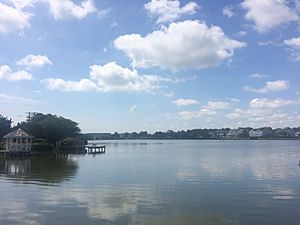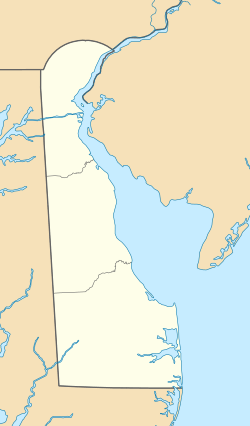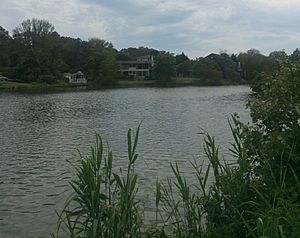Silver Lake (Rehoboth Beach, Delaware) facts for kids
Quick facts for kids Silver Lake |
|
|---|---|

Silver Lake in 2020
|
|
| Location | Rehoboth Beach, Delaware |
| Coordinates | 38°42′22″N 75°04′40″W / 38.70611°N 75.07778°W |
| Type | Freshwater |
| Settlements | Rehoboth Beach, Delaware |
Silver Lake is one of two freshwater lakes located in Rehoboth Beach, Delaware. The other lake is called Lake Comegys. These lakes were created a very long time ago by melting glaciers. Today, they are a special place where birds can live safely, like a bird sanctuary.
Contents
What is Silver Lake?
Silver Lake and Lake Comegys are unique because they are the only natural freshwater lakes in the state of Delaware. They are also the closest freshwater lakes to the Atlantic Ocean in the entire United States!
How were the lakes formed?
Both lakes were formed at the end of the last ice age. This was when huge sheets of ice, called glaciers, started to melt and retreat. The water from these melting glaciers ran off and created the lakes, including Silver Lake.
Silver Lake and Lake Comegys
Silver Lake is the larger of the two lakes. Lake Comegys, which is smaller, was formed later. In the early 1800s, pollution from a nearby factory caused a part of Silver Lake to get blocked off. This created a separate, new body of water, which became Lake Comegys.
How the lakes get water
Both Silver Lake and Lake Comegys are filled by water that runs off the land and by underground springs. In the 1920s, a company used a special method to help clean out mud and dirt that had built up in the lakes.
Protecting the Lakes
Silver Lake and Lake Comegys are very important natural places. People have worked hard to protect them.
A home for birds
In 1933, the state of Delaware officially made both lakes state bird refuges. This means they are protected areas where birds can live and nest without being disturbed. It helps many different kinds of birds thrive.
Natural treasures of Delaware
In 2004, Delaware passed a special resolution. This resolution declared Silver Lake and Lake Comegys to be "natural treasures" of the state. It recognized their unique location near the ocean and their status as Delaware's only natural freshwater lakes.
Managed by a local group
A local non-profit group called Save Our Lakes Alliance3 also helps manage and protect the lakes. They work to keep the lakes healthy and beautiful for everyone to enjoy, especially the wildlife.




